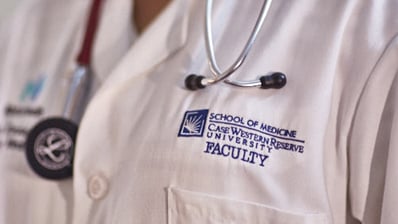Welcome to the Endocrinology, Diabetes and Metabolism Fellowship Program at MetroHealth. We're thrilled that you're considering application to our program, and we feel confident that you've made an excellent choice. We have a lot to offer qualified medical residents who wish to pursue this subspecialty.
As a Level 1 Adult Trauma Center, MetroHealth brings in a great deal of patient traffic each and every day, and often, people who come to the center for an emergency come back again for ongoing medical care. MetroHealth Medical Center is situated in a historically underserved community. Many of the patients that we serve would not have access to health care services in the event that our doors were not open.
As a fellow in our program, you will learn how to diagnose, treat and manage patients who have a variety of endocrine disorders. As you work, you will be surrounded by intellectual curiosity and a dedicated faculty. MetroHealth has a long history of prioritizing research, so that fellows can learn and patients can benefit. Choose MetroHealth, and you will be in touch with that culture every day.
Apply Online
Applications are accepted through the Electronic Residency Application Service (ERAS) website, where you will find specific application instructions.
Learn More

Fellows
There is one fellow in each of the two years of the training program. This allows for close contact between fellows and attendings with a great deal of one-on-one and one-on-two teaching.

Faculty
We are a teaching hospital of the Case Western Reserve University School of Medicine. All physicians in the Division of Endocrinology have full-time faculty appointments at the medical school.

Curriculum
MetroHealth Medical Center is a tertiary care referral center. Our fellows learn to manage a wide variety of inpatient and outpatient endocrine problems.

Research
Fellows are required to engage in scholarly activity during their training, under the direction of a faculty mentor.
We accept applications through the ERAS program. We do not offer any positions outside of the NRMP match.
In principle the Endocrinology Division discourages moonlighting because of the inherent risk of interfering with a fellow’s educational activities.
With that said, we do recognize the need for fellows to gain additional clinical experience as well as to supplement their income. Due to this fact a moderate amount of moonlighting may be acceptable.
The Accreditation Council on Graduate Medical Education (ACGME) requires fellows who wish to engage in moonlighting to give the Program Director a written request for permission to moonlight.
Keep in mind that BOTH internal and external moonlighting count towards the ACGME 80-hour work week limit. To monitor moonlighting privileges, fellows are required to log moonlighting shifts as duty hours in MyEvaluations, on an “as worked” basis.
Moonlighting must not interfere with the assigned duties of the fellow.
Fellows should recognize that when moonlighting away from the medical center campus their MetroHealth malpractice insurance does not cover them.
It is the responsibility of the fellows to ensure that they are adequately covered during their moonlighting activities.
This depends on post graduate year. Please see Salary and Benefits.
We look at the entire application and do not have a strict score cut off. However, because of the nature of our specialty, a fellowship in endocrinology, diabetes, and metabolism is academically challenging and demanding.
You will continue to have to take examinations throughout you training and your career (in training examinations, board certification examinations, re-certification examinations).
Because of this, we favor applicants with a strong history of academic performance and prioritize scores above 220.
As this represents the minority of applicants, we will not prioritize looking at applicants that have failed any portion of the USMLE exams.
We require all applicants to have successfully completed or to be on track to successfully complete internal medicine training in an ACGME-approved internal medicine residency program.
We encourage all qualified applicants to apply regardless of the year in which they completed their internal medicine training.
We accept applications from all qualified US and International graduates. However, we require all applicants to have successfully completed, or to be on track to successfully complete, training in internal medicine in an ACGME-approved internal medicine residency program.
We sponsor both J1 and H1B visas.
We use EPIC for all of our medical records, both inpatient and outpatient.
Cleveland is a city that offers many of the advantages of life in a large metropolitan area without many of the difficulties (e.g. cost of living and excessive traffic).
Advantages of living in Cleveland include easy access to:
- Professional baseball, basketball, and football
- A world-class symphony orchestra with a delightful summer home at Blossom Music Center (where you can sit on the lawn and enjoy a concert)
- Playhouse Square – offering a wide variety of theatrical productions, musicals, ballet, dance, and concerts
- The Metroparks “Emerald Necklace” - an extensive system of 18 nature preserves encircling Greater Cleveland, offering over 300 miles of walking, bicycle, and horse trails as well as numerous picnic areas, nature education centers, golf courses, and countless fishing spots.
- The Cleveland Metroparks Zoo – covering 183 acres and home to 3000 animals, with attractions including the Australian Adventure, African Savanna, Northern Wilderness Trek, Primate, Cat & Aquatics Building, Waterfowl Lake, RainForest, and the newly added Asian Highlands. The Cleveland Zoo has one of the largest primate collections in North Americ
- The Cleveland Museum of Art - named the second best museum in the U.S. by Business Insider magazine (topped only by the Metropolitan Museum of Art in New York City).
- University Circle – in addition to being the home of the Cleveland Museum of Art, University Circle also includes the Cleveland Botanical Gardens, the Cleveland Museum of Natural History, the Museum of Contemporary Art, and the Cleveland Institute of Music
- The biennial Cleveland International Piano Competition
- The annual Cleveland International Film Festival
- And, of course, the Rock and Roll Hall of Fame
For more information, see Living in Cleveland.
Additional Questions?
For more information, please email us.
Program Highlights
Our fellowship is distinguished by the following:
- It is a small fellowship, which allows for a high faculty-to-fellow ratio and an unusually close working relationship between faculty and trainees. Fellows enjoy a great deal of one-on-one and one-on-two teaching, and are exposed to several different approaches to disease management in the course of an average week.
- It is not a “service fellowship.” It was established to give the faculty an opportunity to teach and to pursue scholarly activities. There was never any need to provide help in shouldering the clinical burden on the faculty.
- It is a program that is dedicated to didactic teaching. We offer a weekly board review session and a biweekly series of didactic lectures and teaching sessions on important topics in endocrinology. Faculty and fellows gather every week for an academic meeting that can include journal club, discussion of difficult and interesting cases, board review questions, outside speakers, review of interesting or difficult scans with radiologists, and literature reviews presented by the fellows. There is also a quarterly Medical-Surgical Endocrinology Conference. Fellows are regularly updated with new guidelines that are discussed at the weekly academic meeting.
- Because we are a safety net hospital our program provides a clinical experience that is enriched with patients from underserved populations. We see patients who participate fully in their disease management, and patients who require our patience, perseverance, and individualized teaching. Our patients present with unusual problems such as myxedema coma and thyroid storm as well as the more common problems such as Graves’ disease and type 2 diabetes. There is also a wide variety of inpatient consultations including diseases of the thyroid, adrenal glands, parathyroid disease, pituitary disease, and diabetes.
- There is a teaching clinic devoted exclusively to management of patients on insulin pumps and continuous glucose monitoring.
- There are three general endocrinology clinics per week in which fellows manage their own panel of patients and, with appropriate supervision, manage a wide range of endocrine diseases including adrenal incidentalomas, pituitary adenomas, type 1 and type 2 diabetes, hypoparathyroidism, hyper- and hypothyroidism, diabetes insipidus, adrenal insufficiency, hirsutism, and polycystic ovary syndrome.
- The outpatient nursing service performs a wide variety of outpatient testing for us, including cosyntropin stimulation tests, saline suppression tests, meal tolerance tests, water deprivation tests, and clonidine suppression tests.
- Through an agreement with the Department of Radiology our fellowship offers training in ultrasound-guided fine needle aspiration biopsy of the thyroid. In 2018-19 our second-year fellow performed 39 ultrasound-guided FNA’s under the supervision of a radiologist.
Aims
The Endocrinology Fellowship at MetroHealth Medical Center is a close-knit, clinically-oriented program whose purpose is to produce excellent clinical endocrinologists who are also skilled educators.
The program aims to train fellows who:
- are able to provide thorough and knowledgeable inpatient and outpatient consultations.
- are effective teachers for their colleagues, medical trainees, and especially for their patients.
- know how to use electronic resources to search the medical literature for new knowledge that is applicable to their patients’ needs.
